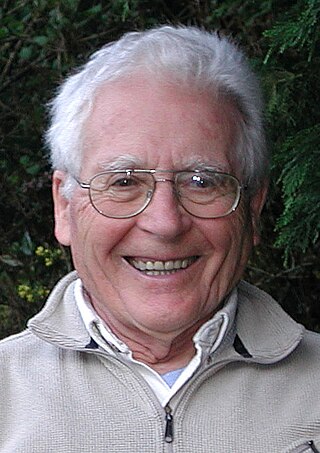
James Ephraim Lovelock was an English independent scientist, environmentalist and futurist. He is best known for proposing the Gaia hypothesis, which postulates that the Earth functions as a self-regulating system.
Patricia Kathryn Helms Kidd was an American author. Many of her books concern the Church of Jesus Christ of Latter-day Saints. She co-wrote some of her works with her husband, Clark L. Kidd, and also co-wrote a novel with Orson Scott Card.

Daisyworld, a computer simulation, is a hypothetical world orbiting a star whose radiant energy is slowly increasing or decreasing. It is meant to mimic important elements of the Earth-Sun system, and was introduced by James Lovelock and Andrew Watson in a paper published in 1983 to illustrate the plausibility of the Gaia hypothesis. In the original 1983 version, Daisyworld is seeded with two varieties of daisy as its only life forms: black daisies and white daisies. White petaled daisies reflect light, while black petaled daisies absorb light. The simulation tracks the two daisy populations and the surface temperature of Daisyworld as the sun's rays grow more powerful. The surface temperature of Daisyworld remains almost constant over a broad range of solar output.
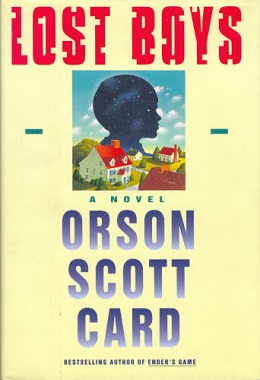
Lost Boys (1992) is a horror novel by American author Orson Scott Card. The premise of the novel revolves around the daily lives of a Mormon family, and the challenges they face after a move to North Carolina. The story primarily follows the family's troubles at work, church, and the oldest child Stevie's difficulty fitting in at school, which lead to him becoming increasingly withdrawn.

The Gaia hypothesis, also known as the Gaia theory, Gaia paradigm, or the Gaia principle, proposes that living organisms interact with their inorganic surroundings on Earth to form a synergistic and self-regulating, complex system that helps to maintain and perpetuate the conditions for life on the planet.
Mayflower was the ship that transported the Pilgrims from Plymouth to the New World in 1620.
Kathryn is a feminine given name and comes from the Greek meaning for 'pure'. It is a variant of Katherine. It may refer to:
The Ender's Game series is a series of science fiction books written by American author Orson Scott Card. The series started with the novelette Ender's Game, which was later expanded into the novel of the same title. It currently consists of sixteen novels, thirteen short stories, 47 comic issues, an audioplay, and a film. The first two novels in the series, Ender's Game and Speaker for the Dead, each won both the Hugo and Nebula Awards.

Nicholas Julian Zapata Sagan is an American novelist and screenwriter. He is the author of the science fiction novels Idlewild, Edenborn, and Everfree, and has also written scripts for episodes of Star Trek: The Next Generation and Star Trek: Voyager. He is the son of astronomer Carl Sagan and artist and writer Linda Salzman.

Shadows in Flight is a science fiction novella by American writer Orson Scott Card. When released in 2012, it became the twelfth book published in the Ender's Game series. The story follows on from where the original four "Shadow series" books left off. It is about Bean and his children discovering an ancient Formic "ark" during their journey in space. It was released in January of 2012. It was nominated for the Goodreads Choice Award for science fiction.
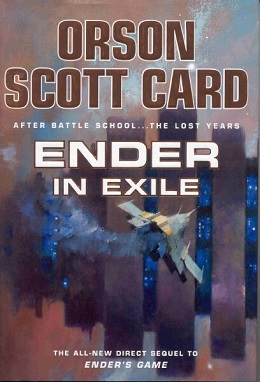
Ender in Exile is a science fiction novel by American writer Orson Scott Card, part of the Ender's Game series, published on November 11, 2008. It takes place between the two award-winning novels Ender's Game and Speaker for the Dead. It could also be considered a parallel novel to the first three sequels in the Shadow Saga, since the entirety of this trilogy takes place in the span of Ender in Exile. The novel concludes a dangling story line of the Shadow Saga, while it makes several references to events that take place during the Shadow Saga. From yet another perspective, the novel expands the last chapter of the original novel Ender's Game. On the one hand, it fills the gap right before the last chapter, and on the other hand, it fills the gap between the last chapter and the original (first) sequel. Ender in Exile begins one year after Ender has won the bugger war, and begins with the short story "Ender's Homecoming" from Card's webzine Intergalactic Medicine Show. Other short stories that were published elsewhere are included as chapters of the novel.
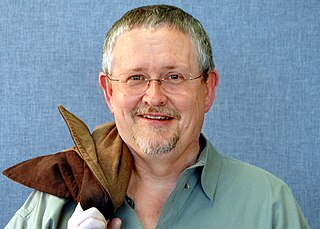
Orson Scott Card is an American writer known best for his science fiction works. He is the first and only person to win both a Hugo Award and a Nebula Award in consecutive years, winning both awards for both his novel Ender's Game (1985) and its sequel Speaker for the Dead (1986). A feature film adaptation of Ender's Game, which Card co-produced, was released in 2013. Card also wrote the Locus Fantasy Award-winning series The Tales of Alvin Maker (1987–2003).
The Orson Scott Card bibliography contains a list of works published by Orson Scott Card.

Treasure Box (1996) is a horror novel by American writer Orson Scott Card. It takes place in modern-day America.

Empire is a 2006 dystopian novel by American writer Orson Scott Card. It tells the story of a possible Second American Civil War, this time between the Right Wing and Left Wing in the near future. It is the first of the two books in the Empire duet, followed by Hidden Empire with the video game Shadow Complex bridging the two.

Sarah: Women of Genesis (2000) is the first novel in the Women of Genesis series by Orson Scott Card.
The Pathfinder series is a completed series of novels by Orson Scott Card that is notable for its unusual fusion of the themes of science fiction and fantasy, with some elements of historical fiction. One significant aspect of the Pathfinder series is its uniquely complex but well documented set of time travel rules.
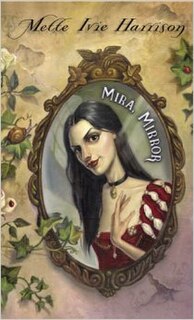
Mira, Mirror is a young adult fantasy novel written by Mette Ivie Harrison. The novel was first published in 2004. The story of the novel is told from the viewpoint of the magic mirror from the fairy tale "Snow White". "Mira" is a main character.

The Hive is a 2019 science fiction novel by American writers Orson Scott Card and Aaron Johnston, and the second book of the Second Formic Wars trilogy of novels in the Ender's Game series. It was released on June 11, 2019.













